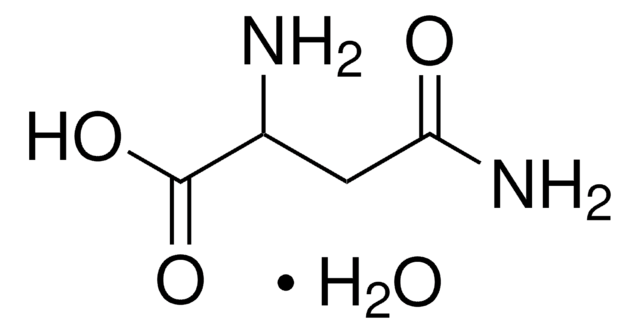A0884
L-Asparagine
≥98% (HPLC)
Synonym(s):
(S)-2-Aminosuccinic acid 4-amide, L-Aspartic acid 4-amide
About This Item
Recommended Products
Product Name
L-Asparagine, ≥98% (HPLC)
Quality Level
Assay
≥98% (HPLC)
form
powder
color
white
mp
235 °C (dec.) (lit.)
application(s)
detection
SMILES string
N[C@@H](CC(N)=O)C(O)=O
InChI
1S/C4H8N2O3/c5-2(4(8)9)1-3(6)7/h2H,1,5H2,(H2,6,7)(H,8,9)/t2-/m0/s1
InChI key
DCXYFEDJOCDNAF-REOHCLBHSA-N
Looking for similar products? Visit Product Comparison Guide
Application
- to identify and quantify free amino acids released upon oxidation of proteins and peptides by hydroxyl radicals
- to study the effects of amino acids in promoting food consumption in Drosophila melanogaster
- to study non-enzymatic gluconeogenesis
Biochem/physiol Actions
Storage Class Code
11 - Combustible Solids
WGK
WGK 1
Flash Point(F)
Not applicable
Flash Point(C)
Not applicable
Personal Protective Equipment
Choose from one of the most recent versions:
Certificates of Analysis (COA)
Don't see the Right Version?
If you require a particular version, you can look up a specific certificate by the Lot or Batch number.
Already Own This Product?
Find documentation for the products that you have recently purchased in the Document Library.
Customers Also Viewed
fructose 1,6-bisphosphate in ice
Chromatograms
application for HPLCOur team of scientists has experience in all areas of research including Life Science, Material Science, Chemical Synthesis, Chromatography, Analytical and many others.
Contact Technical Service







